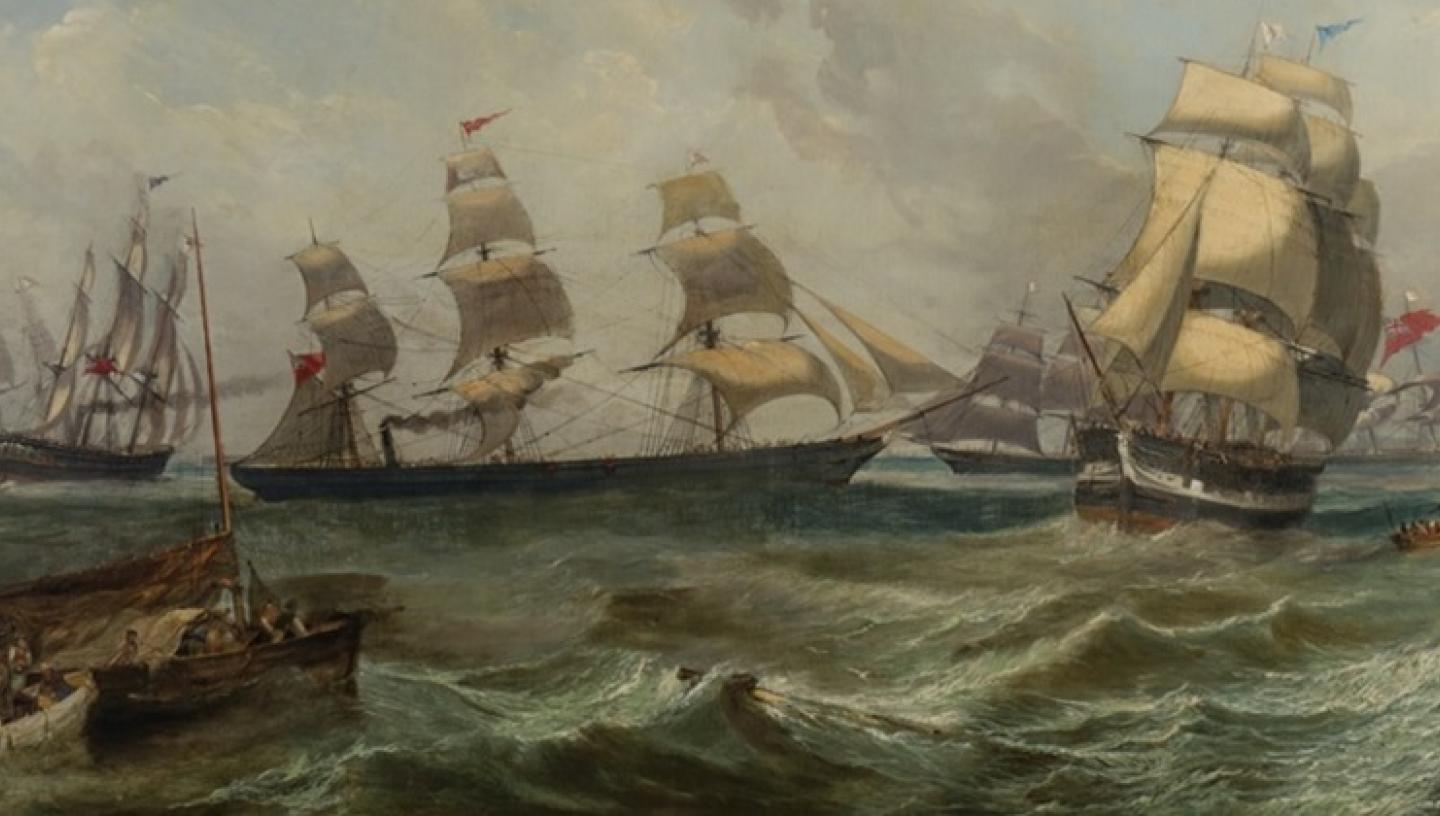
In July 1988, the National Maritime Museum purchased the papers of William Schaw Lindsay. Comprising an extensive collection of journals, diaries, newspaper cuttings and correspondence, it covers the period throughout his life and relates mostly to matters nautical. The Caird Library is grateful for this guest-authored piece, written by Lindsay’s great-great-grandson, William Stewart Lindsay, who is researching his illustrious forebear.
by William Stewart Lindsay
Visit the Caird Library and Archive

For a century after Lindsay’s death, the collection had lain dormant in a trunk in his home, Shepperton Manor, near London. Only then was it exhumed and collated by the Steward of the Manor, Hilda Kirkwood.
Now archived in the Caird Library, the collection, though largely unpublished, is available for public viewing. Although Michael Clark’s paper from The Northen Mariner, William Schaw Lindsay: righting the wrongs of a radical shipowner, provides valuable insight into the documents, it is the papers themselves, coupled with Lindsay’s published work, that provide the best source of information and personal reminiscences. This example from Lindsay's History of Merchant Shipping and Ancient Commerce concerns Brunel’s Great Eastern:
'In the summer of 1857, the late Robert Stephenson and I paid a visit to the ship. We were accompanied by Brunel. The hull was then drawing towards completion, and preparations for launching were about to be commenced. After thoroughly inspecting everything about the vessel, Brunel asked me what I thought of her. “Well,” I replied, she is the strongest and best built ship I ever saw and she is really a marvellous piece of mechanism. “Oh,” he said, rather testily and abruptly, “I did not want your opinion about her build. I should think I know rather more about how an iron ship should be put together than you do. How will she pay?”
“Ah,” I replied, “that is quite a different matter;” and, seeing that I did not care to answer his question, he repeated it, adding, “If she belonged to you in what trade would you place her?”
“Turn her into a show,” I said, with a laugh, “something attractive to the masses; for, if you insist on having my opinion about her commercial capabilities, it is only in that direction where you can look for profit. She will never pay as a ship. Send her to Brighton, dig out a hole in the beach and bed her stern in it, and if well set she would make a substantial pier and her deck a splendid promenade; her hold would make magnificent saltwater baths and her ’tween decks a grand hotel, with restaurant, smoking and dancing saloons, and I know not what all. She would be a marvellous attraction for the cockneys, who would flock to her in thousands.” And, as I saw he was far from pleased with my answer—no wonder—though given half in joke and half in earnest, I added, "As you would insist on having my opinion, I have given it to you candidly, for I really do not know any other trade, at present, in which she will be likely to pay so well.” Stephenson laughed but Brunel never forgave me.'
That reply, though hardly diplomatic, was on the ball. Brunel’s great ship was a liner for only five unprofitable years before being used for eight years as a cable-laying vessel. Her final indignity was to become a showboat and advertising hoarding on the Mersey.
Find out more about Brunel's Great Eastern

Lindsay was the epitome of the Victorian self-made man. He was born in Ayr in 1815, the youngest of five children. When his intemperate and bankrupt father died, his destitute mother was reduced to taking lodgers in Glasgow. When she too died, the orphaned ten-year-old Lindsay returned to his birthplace where he was raised by an uncle and attended Ayr Academy. In his mid-teens, he ran away to sea and, within six years, was master of a merchant vessel. Two years later he returned to land and became a leading London shipbroker.
By the 1850s, Lindsay’s enterprise had become the UK’s largest shipping company. From 1854-1864, he was a radical Liberal MP for north-eastern shipbuilding towns and his advice on shipping was sought by successive governments. But, during the American Civil War, to the chagrin of his radical colleagues, he supported the Confederacy.
In December 1864, a paralytic stroke rendered Lindsay wheelchair-bound. It forced him to give up his seat in Parliament and to sell his Shipping Company to his partners in 1869 (that Company, Galbraiths Ltd Shipbrokers, still exists today). However, his mind was unimpaired. He turned his considerable talents to writing, continuing his diary and publishing several books, both fiction and non-fiction, until his death in 1877.
Additional items William Stewart Lindsay has unearthed include meetings with Queen Victoria, Napoleon III, Garibaldi, Disraeli, David Livingstone, Joseph Paxton, Charles Dicken’s brother, and an impromptu dinner with Abraham Lincoln.